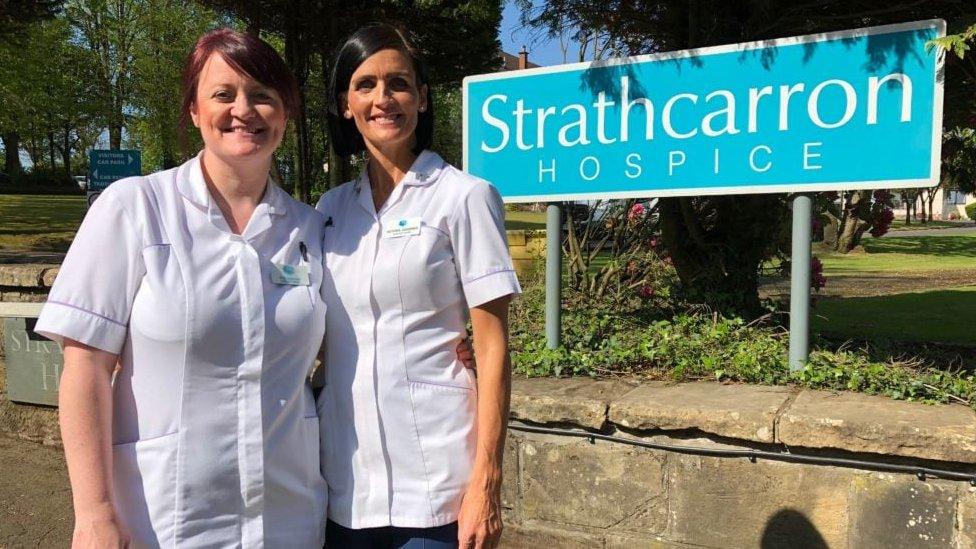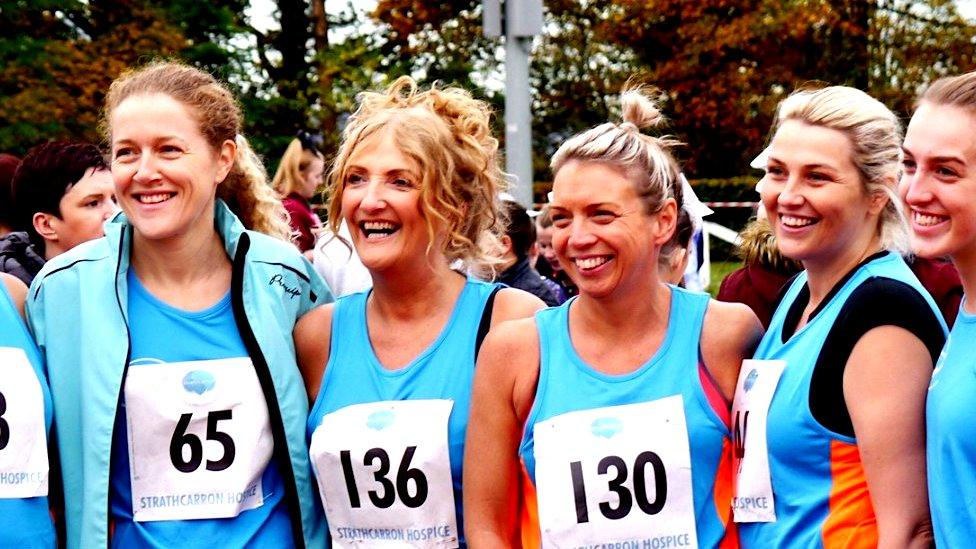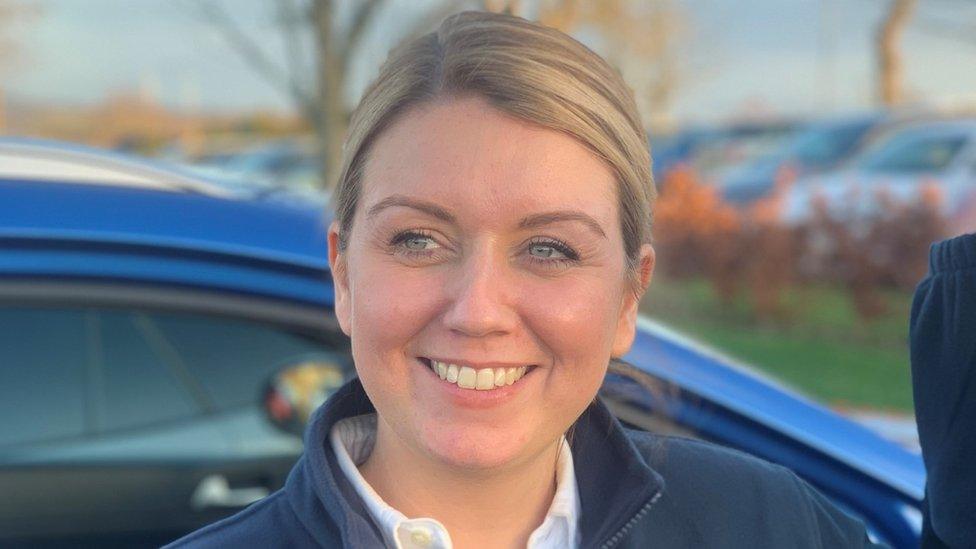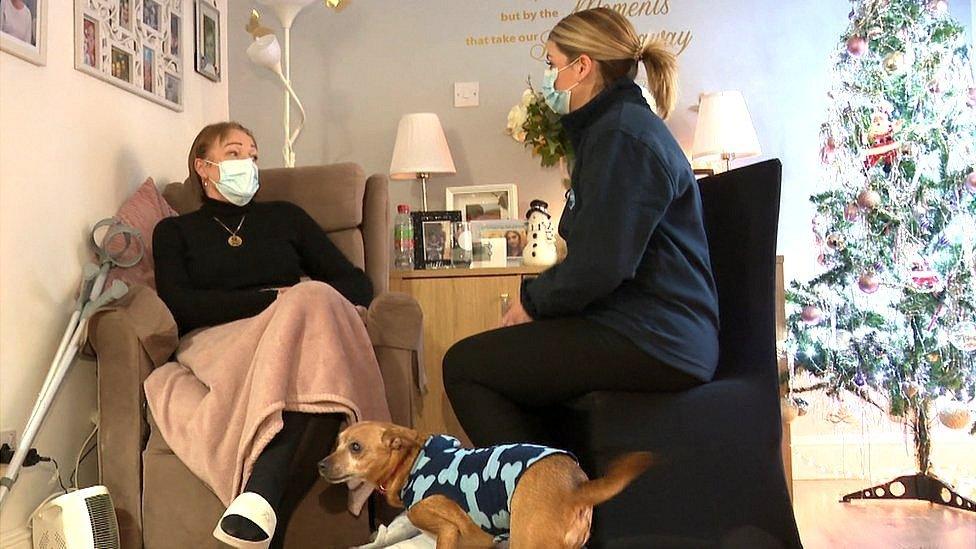The Scottish hospice struggling with the true cost of living
- Published

Cost of living is a phrase that holds much more weight at Strathcarron Hospice in Denny.
Its web page states its ethos of helping people with life-limiting conditions to live and die well.
But soaring energy bills, inflation and rising costs of medical products mean it is getting increasingly difficult to maintain services at their current level.
Without meaningful financial intervention from the NHS, bosses will have to consider making cuts.
Irene McKie, Strathcarron's chief executive, said: "We always pay our staff the same rates as the NHS because we want to get the best people possible."
But the hard fought pay rise on its way to some NHS staff, although well-deserved, would add about £600,000 to the hospice running costs.
Ms McKie added: "That is massive. We would need to find most of that money ourselves.
"We are a very specialist service with an incredibly fantastic range of staff.
"And we pay for them with coffee mornings and 10k runs and ladies lunches. It seems ridiculous that's the way we have to fund the service."

The hospice is reliant on 10k races, ladies' lunches and coffee mornings to survive
Currently one third of the hospice is government funded. NHS Forth Valley contribute £2.6m to running costs while NHS Lanarkshire contributes £550,000.
Strathcarron has to fundraise £14,632 of its own money every day to keep the doors open.
Ms McKie said: "We, in theory, get 50% of our funding from the NHS but in practice, it's 32% because it hasn't kept up with the rate of inflation."
Since Ms McKie took over as chief executive of the hospice, the number of patients they care for in the community has doubled.
However, NHS funding has not increased, meaning the services the hospice team has spent a number of years building are now at risk as people are less able to donate.
'Dipping into the bank account'
Ms McKie told BBC Scotland: "We're now getting in to the situation where we're having to keep dipping into the bank account to keep going and we can't keep doing it because eventually we wouldn't be a viable charity or business."
Strathcarron Hospice said it had tried to enter into talks with Forth Valley health board in October to review the level of funding it receives - something which was last done in 2006.
Ms McKie said: "We have said we're going to have to make big decisions if we don't get additional funding. We actually haven't had a response to that.
"The conversation we want with the health board is, what is it you don't want us to do?
"Because they actually want us to do everything we're doing - they just hope we magically find the funding for it ourselves."
There are 24 beds at Strathcarron Hospice but at any one time they look after around 400 people at home in the community, anywhere from Callander to Kilsyth.
'Pain wasn't the real concern, money was'

Paula McLaren finds more and more of her patients are worried about money
Paula McLaren is a community clinical nurse specialist. She visits people in their homes and advises on everything from pain management to financial support. The latter is something she is having to do much more regularly.
She said: "I saw a lady yesterday who has an advanced cancer, and at first I was met with a bit of hostility.
"Her family were really frustrated, really anxious at the situation they're living in. They just don't feel like they've had very much support in the year and a half since her diagnosis.
"She had overwhelming, really complex pain, nausea and horrible physical symptoms. But that wasn't her main concern.
"It was really her financial worries. How is she going to heat her home or pay her bills? And that's a worry for a lot of my patients at the moment."
Paula was able to organise financial help and ensure she could stay at home as she wanted.
She added: "At the end of the visit her husband actually fell asleep. He said: 'I'm just so relieved that someone is actually here to help my wife and answer all of these big questions we've had for so long'."

Community nurse specialist Paula McLaren visits the home of Rosanne Verhees in a vital service to patients
Rosanne Verhees was diagnosed with metastatic Breast Cancer in 2014, which had spread to her bones. She is also worried about money.
She told BBC Scotland: "I'm terrified the money is going to run out because I need to keep myself warm, I'm always really cold with my treatment. It's a huge worry."
Rosanne said navigating a diagnosis like hers is terrifying but the care she's received from the hospice since 2016 has made difficult days a bit brighter.
"Having them in my life, knowing you can get the visits and you have the support of different services, makes me think of myself as really lucky," she added.
'Significant financial challenges'
As budgets continue to be squeezed and people have less money in their pockets to donate to charities, the level of need and the level of care required remains unchanged.
Clackmannanshire, Stirling and Falkirk Health and Social Care Partnerships (HSCP) and NHS Forth Valley said they had a high regard for the palliative care services provided by Strathcarron Hospice and the positive impact this had in providing care and support for families at times of great need.
A spokesman said: "We appreciate the financial pressures the hospice is facing and have supported the hospice to access substantial Covid funding support over the past two years.
"The Hospice has also received significant levels of additional funding as part of our local Service Level Agreement (SLA) most recently during the 2021/22 financial year in a bid to address a range of budget pressures.
"A further interim funding uplift was provided in the current financial year which will be reviewed and updated once the NHS pay rise has been agreed."
The health authorities said that they would continue to seek "open and active" dialogue with Strathcarron.
The spokesman added: "Recognising that all partners are experiencing, and will continue to face, significant financial challenges going forward, we remain committed to working with the hospice acknowledging the constraints of resources available."